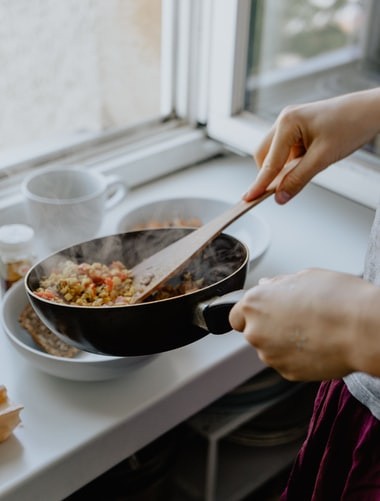
The COVID-19 pandemic has interrupted activities in our daily routine, including going out to eat at restaurants and has dramatically altered shopping for groceries. Preparing food at home needs to be handled carefully.
Last month, U.S. President Donald Trump said that the novel coronavirus "will go away in April," adding that "the heat, generally speaking, kills this kind of virus."
The pandemic grocery shopping routine typically goes like this: Practice social distancing, grab essentials that your family needs, sanitize your hands, and then wash them again upon arriving home, and once more after putting your groceries away.
The questions posed if the goods you bought are safe to consume as-is and does heating the coronavirus via cooking successfully kill it before it can enter your system?
As of now, how the coronavirus will behave as temperature soars is not known.
The family of coronavirus can spread from person-to-person transmission through respiratory droplets. There is no evidence yet to support transmission linked with food.
Although businesses are shuttered across the globe, restaurant chefs are continuing to serve meals for the healthcare workers, people in vital services, and the public.
On the chance of contracting the coronavirus from eating takeout foods, Angela L. Rasmussen, Ph.D., a virologist in the faculty of the Center for Infection and Immunity at the Columbia Mailman School of Public Health, remarked, "There is no evidence that SARS-CoV-2 can be transmitted by eating food. I imagine that if this is possible, the risk is extremely low."
Another scientist agrees. "We don't really have any evidence that food or food packaging is a source for getting sick" from the coronavirus, according to Benjamin Chapman, a professor and food safety specialist at North Carolina State University.
Chapman said our understanding of the prevalence of the illness and the risk associated with food could change as more information is gathered.
The rules are constantly evolving, so it is advised to consult the Centers for Disease Control and Prevention (CDC) and Food and Drug Administration (FDA) with the most up-to-date information.
Kali Kniel, Ph.D., a professor of animal and food sciences at the University of Delaware and the president of the International Association for Food Protection, said, "It is not likely to survive the acidity of the stomach in the way that foodborne bacteria and viruses are able to."
The information gleaned from outbreaks of SARS and MERS, caused by coronaviruses alike to the one that spawns COVID-19, is also reassuring that food is not currently believed to be a route of carrying the virus.
An article noted that prevention still makes sense. This is where good food safety habits come in. "The same things you do to prevent infection with bacteria that cause foodborne illness, such as E. coli or salmonella, would protect you against any virus," said James E. Rogers, Ph.D., Consumer Reports' director of food safety research and testing.
Related Article : COVID-19 Patients Can Suffer From Long-Term Bodily Damage
© 2026 HNGN, All rights reserved. Do not reproduce without permission.








